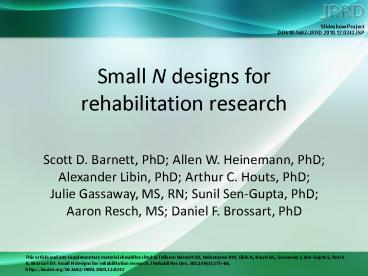Small N designs for rehabilitation research - PowerPoint PPT Presentation
1 / 5
Title:
Small N designs for rehabilitation research
Description:
Small N designs for rehabilitation research Scott D. Barnett, PhD; Allen W. Heinemann, PhD; Alexander Libin, PhD; Arthur C. Houts, PhD; Julie Gassaway, MS, RN; Sunil ... – PowerPoint PPT presentation
Number of Views:217
Avg rating:3.0/5.0
Title: Small N designs for rehabilitation research
1
Small N designs for rehabilitation research
- Scott D. Barnett, PhD Allen W. Heinemann, PhD
Alexander Libin, PhD Arthur C. Houts, PhD
Julie Gassaway, MS, RN Sunil Sen-Gupta, PhD
Aaron Resch, MS Daniel F. Brossart, PhD
2
- Study Aim
- Summarize strategies that rehabilitation
researchers may consider for studying issues with
expected small sample sizes. - Relevance
- Underpowered studies, sample size requirements,
and recruitment goals often plague rehabilitation
research. - Quasi-experimental and experimental small N
designs are ideal methods for clinical research
in which understanding and changing maladaptive
patterns in behavior and functional status are
primary goals.
3
Methods
- January 2010 State-of-the-Art conference
- Department of Veterans Affairs (VA)
Rehabilitation Research and Development Service
convened conference in Miami, Florida, to discuss
current and future seminal issues pertinent to
rehabilitation research both with and without VA
services.
4
Results
- For single-case research
- Field has moved from visual analysis only to both
visual and statistical analysis. - Visual analysis of single-case data graphed over
time is no longer sufficient. - All single-case data should be analyzed using
both visual and statistical methods.
5
Conclusions
- Small N studies (including pilot studies)
- Should be conducted more often.
- Are especially important in rehabilitation.
- Are specifically important during initial
research development and the study of complex
behavioral issues associated with co-occurring
conditions. - Administrators, grant reviewers, and journal
editors should be educated on value of small N
studies.































